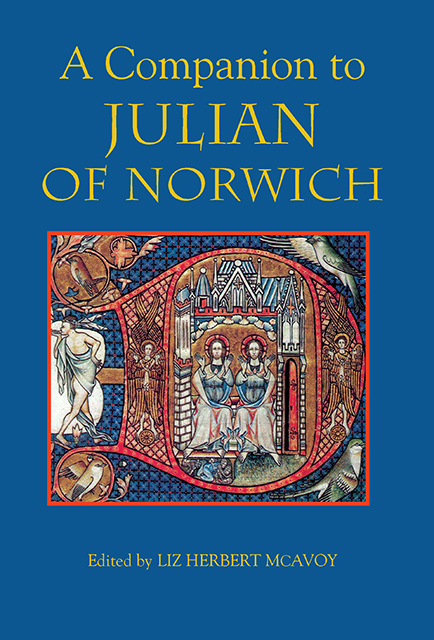9 - ‘This Blessed Beholdyng’: Reading the Fragments From Julian of Norwich’s A Revelation of Love in London, Westminster Cathedral Treasury, MS 4
Published online by Cambridge University Press: 10 March 2023
Summary
Julian of Norwich's writings have come down to us in a limited number of manuscripts, only two of which are medieval. London, British Library MS Additional 37790 (Amherst) was written around 1450, most likely in an English charterhouse. It is an anthology of five complete authorial texts in Middle English interspersed with shorter extracts and compilations. In this manuscript Julian's Short Text, A Vision Showed to a Devout Woman, follows Richard Misyn’s Middle English translations of Richard Rolle's Emendatio vitae and Incendium amoris and is itself followed by the Middle English translation of Ruusbroec’s Vanden blinkenden steen and M. N.'s Middle English translation of Marguerite Porète's Mirouer des Simples Âmes, all of which describe and provide instruction regarding the contemplative life. The second medieval manuscript that preserves some of Julian's writing is London, Westminster Cathedral Treasury MS 4 (W), a manuscript of unknown provenance datable to around 1500. The single text contained in this manuscript is a compilation which is entirely made up of fragments from existing texts: commentaries on Psalms 90 (Qui habitat) and 91 (Bonum est), probably by Walter Hilton, Books I and II of Hilton's Scale of Perfection and A Revelation of Love, the long version of Julian's text.
What both manuscripts have in common is that they place A Vision Showed to a Devout Woman (in full) as well as A Revelation of Love (in fragments) in context, aligning or juxtaposing the texts with other texts written by mainly contemporary contemplative authors. As neither the Amherst anthologist nor the compiler of the Westminster compilation account for their decisions in a prologue in which the intended readers are addressed, any information about their intentions needs to be gleaned from the texts themselves, and from the contents and placement of the adjacent texts. The Revelation fragments in Westminster have so far largely been treated in isolation. In this essay, therefore, I would like to reassess the compiler's selections from A Revelation in the context of the compilation as a whole, following onto and interacting with the selections from the Qui habitat and Bonum est expositions and from the Scale of Perfection.
- Type
- Chapter
- Information
- A Companion to Julian of Norwich , pp. 116 - 126Publisher: Boydell & BrewerPrint publication year: 2008



